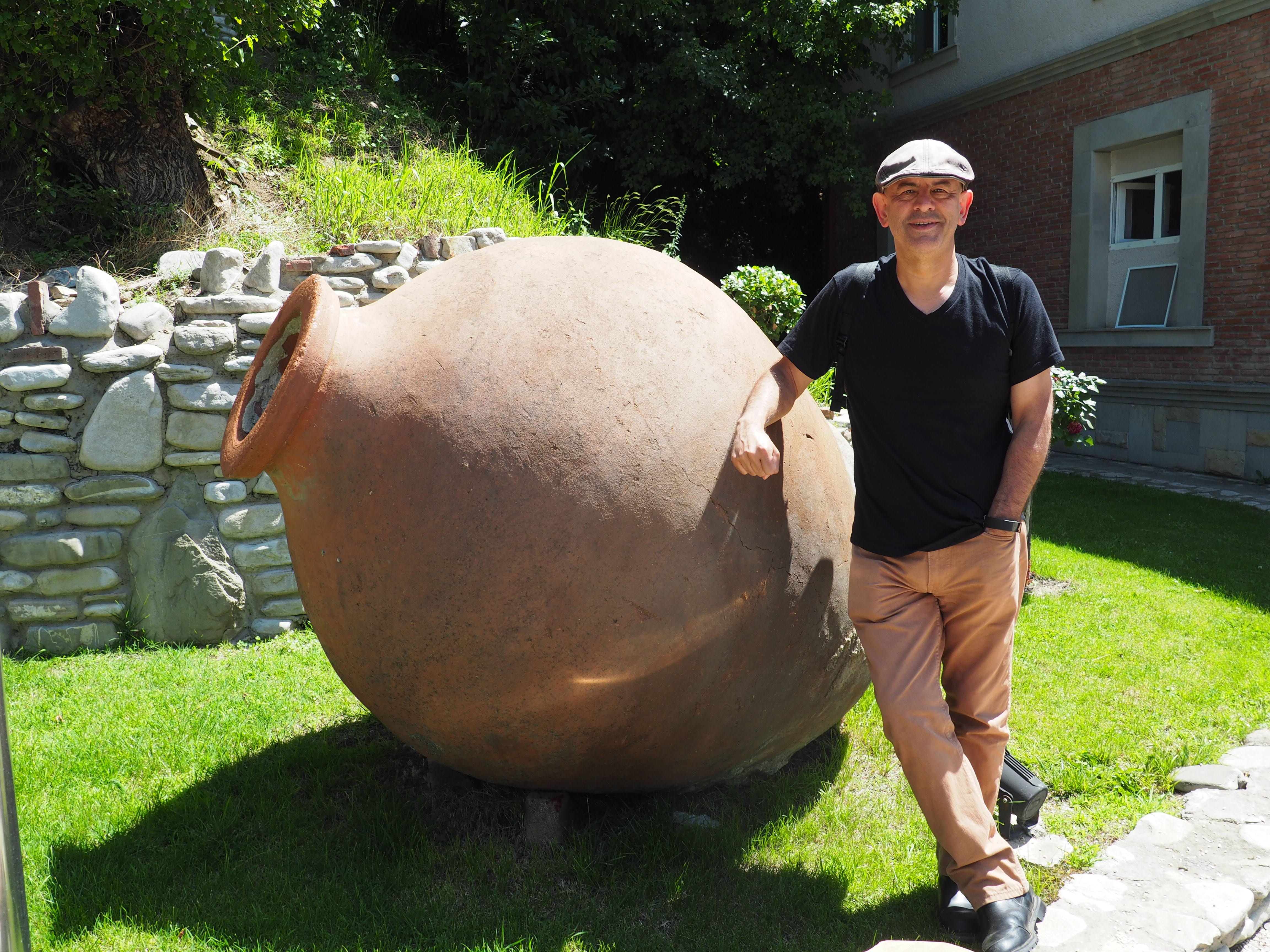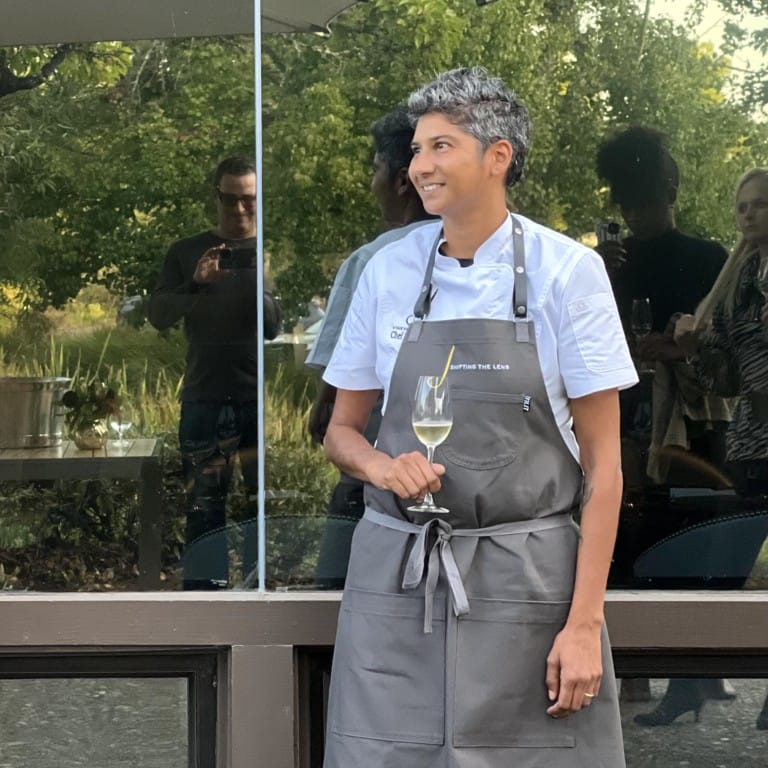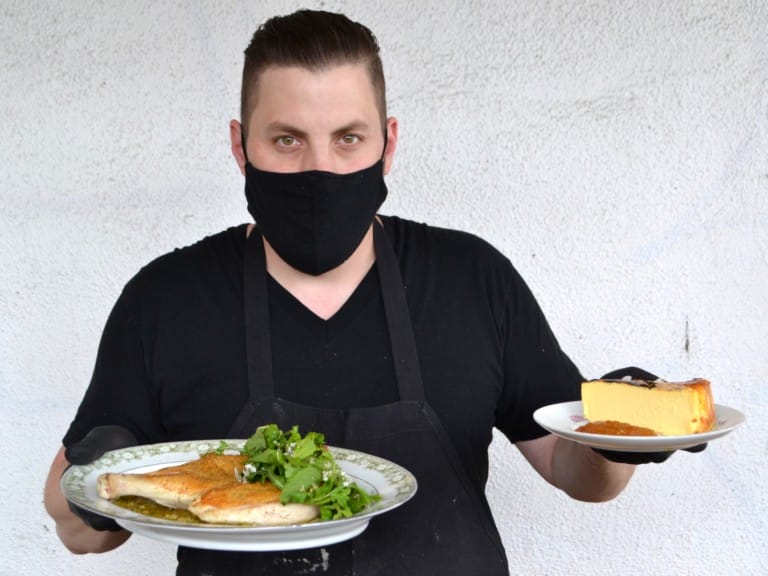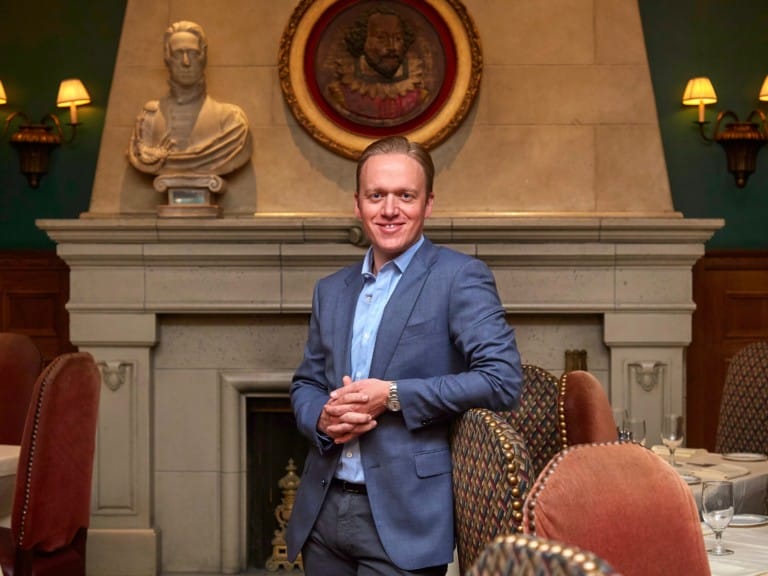Noted British-born storyteller Simon Majumdar continues his mission to “Go Everywhere. Eat Everything.” He started a popular blog called Dos Hermanos with brother Robin in 2005, which propelled him to prominence. Since then, he’s written about restaurants for publications like The Guardian and The Times of London and currently works as critic for Time Out Los Angeles. Majumdar has also written three books: Eat My Globe, Eating For Britain, and Fed, White, and Blue. Still, he has become best known for his TV appearances, where he’s weighed in as a judge and personality on shows like Cutthroat Kitchen, Beat Bobby Flay, Iron Chef America, The Next Iron Chef, The Best Thing I Ever Ate, and Extreme Chef. He recently launched Season 2 of a podcast called EAT MY GLOBE: Things You Didn’t Know You Didn’t Know About Food, where he tackles titanic (sometimes, literally) themes like the rise of chocolate, sushi, and beef. I recently interviewed Majumdar by e-mail, where he shared insights into all facets of his multi-dimensional, food-focused career.
Josh Lurie: What do you prefer about the podcasting medium versus print or TV?
Simon Majumdar: I am not sure I would use the word “prefer” about podcasting, or indeed about any type of communication medium. I think they all have a purpose. That being said, I do think that podcasting gives a more personal touch, as it’s in your own voice (or at least it is in my case). It can be a little more long form, which doesn’t always happen in print and TV. That’s great for explaining a complicated story. And, podcast listening has definitely developed its own passionate audience of supporters who listen while commuting, working out, or as I often do, while in the kitchen.
JL: What are three of the most surprising food facts you’ve learned while researching the “Eat My Globe” podcast?
SM: One of the reasons that I subtitled “Eat My Globe” as “Things you didn’t know, you didn’t know about food” is because when you look at the food history of even something quite ubiquitous, you can find amazing facts, people or twists of fate that made them possible.
There are hundreds to choose from, but if I had to pick out three, from the top of my head:
Potatoes were illegal to eat in late 18th Century France, as they were believed to cause Syphilis (amongst other things) – and they were only popularized thanks to a man called Antoine-Auguste Parmentier who had been fed them while a prisoner of war of the Austrians. Frederick The Great was a huge fan of them and people still leave potatoes on his grave as a mark of respect.
The fact that SPAM® can trace its history back to an 18th Century French Champagne producer called Nicolas Appert, who won a competition to produce food for Napoleon’s armies. He pressurized tomato sauce in old Champagne bottles to create the first canned food. Oh, and he also invented the Bullion cube.
That tea production in India owes its existence to one of the great acts of industrial espionage in history, when a British botanist named Robert Fortune disguised himself as a Chinese civil servant and went and purloined the ancient secrets of tea making and stole tea plants under pain of death. He brought them to India and helped begin their own tea industry.
JL: What will it take for you to consider the “Eat My Globe” podcast a success? You may already.
SM: There are obviously numerical ways of judging success, and I have to say, that by those standards, we are doing quite well. I am told by people in the know that we are in the top 15% of podcasts in terms of downloads, which is very satisfying.
However, I do think there are aspects of podcasting that are less tangible, but equally satisfying.
Do I enjoy doing it? Absolutely, and I would do it anyway even if we had far fewer listeners. I love the process of the research and recording. In fact, I would argue it is when I am at my most content.
Do we do it well? I think so, for which the most credit must go to the Department of History at UCLA, my wife, Sybil, who is an astonishing researcher, and to my amazing producer, April Simpson.
Do we leave something behind that may be of use? I hope so, and the less modest side of me hopes that some historian in the future may listen to these and glean something.
JL: What was your very first professional food writing assignment? How did it come about, and how did the story turn out?
SM: Odd though it may sound, I can’t really recall what was my first professional food writing assignment. I got asked to do a few things by people who had connected to me on the old school food boards (Chowhound and Egullet), and I had contributed a few inserts to food history “Bathroom” readers, but at that point, I was still a book publisher who wrote a little bit.
My old blog (Dos Hermanos), one of the first, particularly in the U.K, became quite successful and on the back of that I pitched some ideas to the London Times and The Guardian. I think my first was for the Guardian “Word of Mouth” daily food blog and was on the joy of fat in food. It got a good response, and I ended up writing quite a lot for them over the next few years.
I actually miss writing features and have made it a short-term goal to start doing more again (anyone?). I had to move back because of pressures from other areas of my career, such as TV and speaking. But, now I am looking to do more. Hence me recently taking on the role of restaurant reviewer at Time Out Los Angeles.
JL: How did your very first TV appearance come about? Also, were you happy with the results?
SM: My longtime manager, John Tomko, got in touch when he heard me on the BBC World Service and offered to represent me. He arranged many general meetings for me in Los Angeles, one of which included the terrific people who produce “Iron Chef America.” They came back and offered the position of judge on the Food Network’s “The Next Iron Chef” (Season #3) alongside Michael Symon and Donatella Arpaia. I had done a tiny bit of TV in the U.K, but certainly nothing on this scale. I suddenly found myself on a beach with my fellow judges and Alton Brown judging some of the best chefs in the country. It was quite a trial by fire, but I was very fortunate that the producers, crew, and my on-camera colleagues were all immensely supportive.
The fact they have kept asking me back for the last decade makes me think I did OK.
JL: At what point did you become comfortable on TV? What did it take to feel comfortable in front of a camera?
SM: I have never really felt uncomfortable in front of the camera, with the possible exception being when I was asked to dress as Princess Leia for an episode of “Cutthroat Kitchen.” But even then, I think I carried it off with some aplomb.
JL: What has been your single favorite TV appearance? What factors made that segment or episode so special?
SM: There have been many memorable shows over the years, but perhaps my favorite was when I was fortunate enough to be asked to join the “Iron Chef” family when they filmed on a military base in Hawaii. We took over a full crew, Alton, the Chairman, three Iron Chefs (Michael Symon, Cat Cora and Morimoto) and some judges. We recorded two episodes in front of an audience of military personnel and their families. They were about to deploy, and to entertain them before they left was a huge honor. It was also a great deal of fun.
JL: You’ve developed a reputation as a discriminating critic. It’s inevitable that you’ve faced public pushback for your criticisms in print and on TV. What are some of your most memorable bouts with critics for stating your opinions? Also, what advice would you give other critics about dealing with criticism?
SM: I always think that if you dish it out, you should be prepared to take it, or at least defend it. I think good criticism is not just about the “do I like this?” question, but also about putting the dish/film/book, etc. in context. Looking at the influences up on it and its potential influences upon others. I also think that one must be 100% honest, and not shy away from an opinion, but always fair and never personal.
Criticism is, at its best, an intellectual enterprise, and to that extent, I think it’s important for potential food critics to look towards great critics in other fields. I have learned as much by reading Pauline Kael as I have by reading Jonathan Gold (whose writing I adored – although I often disagreed with him), A.A. Gill or Frank Bruni.
As for spats, I have had a few, which is inevitable. But, not as many as one would imagine. Most chefs get that critics have a place in the family. The only real abuse comes from social media, for which you either develop a thick skin or log out.









Leave a Comment